Posted on May 30, 2020 in
COVER STORY
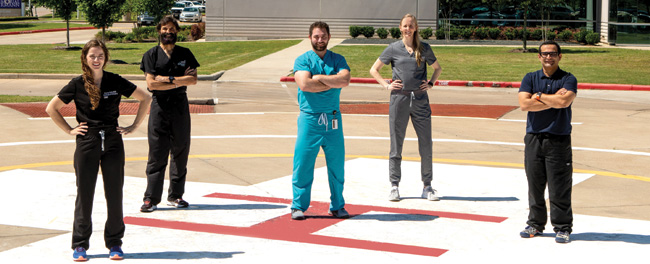
Top photo: Karen Tart, MD, Kulvinder Bajwa, MD, Vincent “Joe” Mandola, MD, Bonnie Gregory, MD and Ankit Mehra, MD.
Photo by Alisa Murray Photography.
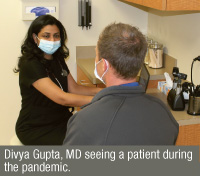 Focus | COVER STORY –
Focus | COVER STORY –
The COVID-19 crisis has been a wake-up call, causing us to reexamine our lifestyles and to redefine what’s truly important. Many of us want our “new normal” to be better than our pre-COVID normal. And we’re resolving to take better care of ourselves and to live our lives more fully.
But where do we begin? Seven physicians affiliated with Memorial Hermann offer their top tips for living healthier, fuller and longer lives.
Know Where You Stand
Your first stop should be your primary care physician for a checkup, even if you feel fine. Primary care physician Divya Gupta, MD, said, “You can have chronic, life-threatening health conditions, including heart disease, diabetes and high cholesterol, and not even know it. Many times, symptoms don’t show up until the disease has progressed.”
Dr. Gupta said it’s important to know your numbers – your blood pressure, blood sugar levels and cholesterol levels, all key indicators of your health. Stay current on your health screenings, including mammograms, colonoscopies, bone density tests and prostate screenings. And finally, talk to your doctor. “Don’t be afraid to ask questions – about your physical, mental and emotional health. That’s why we’re here,” she said.
Lose the Weight
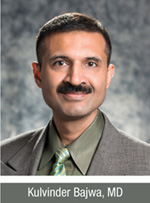 “It’s not about your appearance,” said bariatric surgeon Kulvinder Bajwa, MD, “it’s about your health. Our bodies are designed to function optimally at a certain weight. When we carry excess weight, we put ourselves at higher risk for potentially life-threatening diseases and health conditions, including diabetes, high blood pressure, heart disease and sleep apnea.”
“It’s not about your appearance,” said bariatric surgeon Kulvinder Bajwa, MD, “it’s about your health. Our bodies are designed to function optimally at a certain weight. When we carry excess weight, we put ourselves at higher risk for potentially life-threatening diseases and health conditions, including diabetes, high blood pressure, heart disease and sleep apnea.”
Dr. Bajwa said that while achieving and maintaining a healthy weight – a body mass index (BMI) of 25 or less – can be a lifelong pursuit, losing the weight can actually resolve chronic disease, including type 2 diabetes. If your BMI is 35 or more, you may be a candidate for bariatric weight loss surgery. To discuss weight loss options, schedule an appointment with a bariatric surgeon.
Get Moving
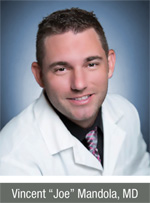 Being physically active is essential to good health, but COVID-19 caused many to put fitness on hold. “Whether you’re getting back into the gym or just getting started, start low and slow,” said primary care sports medicine specialist Vincent “Joe” Mandola, MD. “As a rule of thumb, add 10 percent back a week — 10 percent more weight, more distance, more time — until you’re back to your previous levels. And if you’re exercising outside, watch out for the Houston summer heat, which can cause dehydration and even heat stroke,” he said.
Being physically active is essential to good health, but COVID-19 caused many to put fitness on hold. “Whether you’re getting back into the gym or just getting started, start low and slow,” said primary care sports medicine specialist Vincent “Joe” Mandola, MD. “As a rule of thumb, add 10 percent back a week — 10 percent more weight, more distance, more time — until you’re back to your previous levels. And if you’re exercising outside, watch out for the Houston summer heat, which can cause dehydration and even heat stroke,” he said.
Before starting a new fitness regimen, it’s a good idea to speak to a fitness expert, such as a primary care sports medicine specialist, who will work with you to create a safe and effective exercise plan.
Keep an Eye on Your Heart
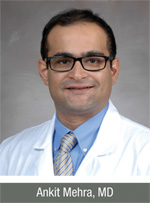 When it comes to heart disease, interventional cardiologist Ankit Mehra, MD, espouses the proverb, ‘a stitch in time saves nine.’ “By taking good care of your health — through diet, exercise, weight control and regular checkups — you can often prevent heart disease. You don’t need to run marathons to stay in shape. Even walking for 30 minutes five times a week can improve your cardiovascular health and boost your immune system,” he said.
When it comes to heart disease, interventional cardiologist Ankit Mehra, MD, espouses the proverb, ‘a stitch in time saves nine.’ “By taking good care of your health — through diet, exercise, weight control and regular checkups — you can often prevent heart disease. You don’t need to run marathons to stay in shape. Even walking for 30 minutes five times a week can improve your cardiovascular health and boost your immune system,” he said.
For those with underlying chronic health conditions, management is the key. “If you’ve been diagnosed with high cholesterol or high blood pressure, see a heart specialist at least once a year, even if you’re not experiencing symptoms. Early recognition of alarming cardiac symptoms, such as chest pain, palpitation, shortness of breath, dizziness or fainting spells, is key. If you experience any of these, see a cardiologist right away,” he said.
Resolve Not to Live with Joint or Back Pain
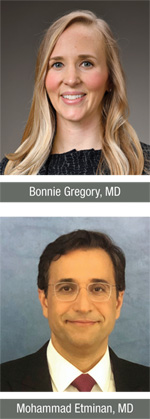 Living a fuller life means living with a better quality of life, which is the why orthopedic sports medicine surgeon Bonnie Gregory, MD, pursued a career in her chosen field. A fitness enthusiast and former athlete, Dr. Gregory said staying active will improve your overall health and can help you avoid or delay the need for joint repair or replacement. She recommends low impact aerobic activity, such as walking, swimming, elliptical and stationary bike, all of which can improve both your cardiovascular and joint health.
Living a fuller life means living with a better quality of life, which is the why orthopedic sports medicine surgeon Bonnie Gregory, MD, pursued a career in her chosen field. A fitness enthusiast and former athlete, Dr. Gregory said staying active will improve your overall health and can help you avoid or delay the need for joint repair or replacement. She recommends low impact aerobic activity, such as walking, swimming, elliptical and stationary bike, all of which can improve both your cardiovascular and joint health.
Many Americans suffer from back pain, which limits their health. Spine specialist Mohammad Etminan, MD, said, “For the functional population — individuals who are able to maintain a medium level of activity, such walking 30 minutes a day — there’s a relatively simple formula for a living healthy life: Stay active, eat well and a maintain a positive attitude. And they are interrelated. If chronic back pain prevents you from moving, the formula falls apart.”
Memorial Hermann affiliated joint and spine specialists employ a broad range of tools to diagnose, evaluate and treat joint and back pain. Treatments range from non-surgical, including education, counseling, exercise, physical therapy and medications, to minimally invasive procedures and surgery.
“Most of my patients don’t require surgery but having access to all treatment modalities gives us a unique ability to provide patients with what is the most appropriate treatment for them,” said Dr. Etminan. “There’s no reason not to take care of yourself and get the care you need,” added Dr. Gregory.
Know that Urinary Incontinence and Erectile Dysfunction Don’t Have to be Part of Your “New Normal”
 Urologist Karen Tart, MD, said what limits both men and women from living fuller lives is their lack of knowledge of available treatments. “People think urology issues are just part of getting older,” she said, “but they’re not. We have several options, including non-invasive therapeutic treatments and medications, for treating bladder leakage and sexual dysfunction in women, and erectile dysfunction and prostate issues in men.”
Urologist Karen Tart, MD, said what limits both men and women from living fuller lives is their lack of knowledge of available treatments. “People think urology issues are just part of getting older,” she said, “but they’re not. We have several options, including non-invasive therapeutic treatments and medications, for treating bladder leakage and sexual dysfunction in women, and erectile dysfunction and prostate issues in men.”
Dr. Tart said stress can be a factor. “Just as some people ‘hold’ stress in their shoulders, others hold it in their pelvis, which can cause urologic problems for both men and women. Sometimes, general stress relief is the prescribed treatment,” she said.
“If you’re having any of these issues, the best thing you can do is see a doctor. While most are little more than a nuisance, some can be signs of a more serious health condition,” she said.
Be Prepared for Health Emergencies Just in Case
Despite our best efforts to prevent medical emergencies, they do happen. Memorial Hermann Sugar Land Hospital is well equipped to handle medical emergencies, including strokes and heart attacks. (If you or a family member thinks you’re experiencing a medical emergency, call 911.) And with the only dedicated children’s emergency room in Fort Bend County, we’re uniquely prepared to care for the youngest members of our community.
While our medical specialists offer slightly different perspectives based on their respective specialties, they all agree on one thing: The healthier you are, the better prepared you’ll be for a health crisis such as COVID-19.
For more info on how you and your family can stay healthy and fit, visit memorialhermann.org/fortbendfamilies. To schedule an appointment with a Memorial Hermann affiliated physician, call 713.222.CARE (2273).
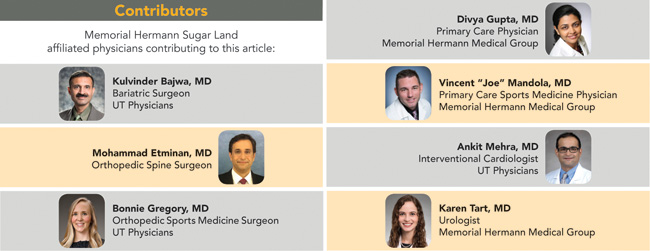

 <
<








 Focus | COVER STORY –
Focus | COVER STORY – “It’s not about your appearance,” said bariatric surgeon Kulvinder Bajwa, MD, “it’s about your health. Our bodies are designed to function optimally at a certain weight. When we carry excess weight, we put ourselves at higher risk for potentially life-threatening diseases and health conditions, including diabetes, high blood pressure, heart disease and sleep apnea.”
“It’s not about your appearance,” said bariatric surgeon Kulvinder Bajwa, MD, “it’s about your health. Our bodies are designed to function optimally at a certain weight. When we carry excess weight, we put ourselves at higher risk for potentially life-threatening diseases and health conditions, including diabetes, high blood pressure, heart disease and sleep apnea.” Being physically active is essential to good health, but COVID-19 caused many to put fitness on hold. “Whether you’re getting back into the gym or just getting started, start low and slow,” said primary care sports medicine specialist Vincent “Joe” Mandola, MD. “As a rule of thumb, add 10 percent back a week — 10 percent more weight, more distance, more time — until you’re back to your previous levels. And if you’re exercising outside, watch out for the Houston summer heat, which can cause dehydration and even heat stroke,” he said.
Being physically active is essential to good health, but COVID-19 caused many to put fitness on hold. “Whether you’re getting back into the gym or just getting started, start low and slow,” said primary care sports medicine specialist Vincent “Joe” Mandola, MD. “As a rule of thumb, add 10 percent back a week — 10 percent more weight, more distance, more time — until you’re back to your previous levels. And if you’re exercising outside, watch out for the Houston summer heat, which can cause dehydration and even heat stroke,” he said. When it comes to heart disease, interventional cardiologist Ankit Mehra, MD, espouses the proverb, ‘a stitch in time saves nine.’ “By taking good care of your health — through diet, exercise, weight control and regular checkups — you can often prevent heart disease. You don’t need to run marathons to stay in shape. Even walking for 30 minutes five times a week can improve your cardiovascular health and boost your immune system,” he said.
When it comes to heart disease, interventional cardiologist Ankit Mehra, MD, espouses the proverb, ‘a stitch in time saves nine.’ “By taking good care of your health — through diet, exercise, weight control and regular checkups — you can often prevent heart disease. You don’t need to run marathons to stay in shape. Even walking for 30 minutes five times a week can improve your cardiovascular health and boost your immune system,” he said. Living a fuller life means living with a better quality of life, which is the why orthopedic sports medicine surgeon Bonnie Gregory, MD, pursued a career in her chosen field. A fitness enthusiast and former athlete, Dr. Gregory said staying active will improve your overall health and can help you avoid or delay
Living a fuller life means living with a better quality of life, which is the why orthopedic sports medicine surgeon Bonnie Gregory, MD, pursued a career in her chosen field. A fitness enthusiast and former athlete, Dr. Gregory said staying active will improve your overall health and can help you avoid or delay Urologist Karen Tart, MD, said what limits both men and women from living fuller lives is their lack of knowledge of available treatments. “People think urology issues are just part of getting older,” she said, “but they’re not. We have several options, including non-invasive therapeutic treatments and medications, for treating bladder leakage and sexual dysfunction in women, and erectile dysfunction and prostate issues in men.”
Urologist Karen Tart, MD, said what limits both men and women from living fuller lives is their lack of knowledge of available treatments. “People think urology issues are just part of getting older,” she said, “but they’re not. We have several options, including non-invasive therapeutic treatments and medications, for treating bladder leakage and sexual dysfunction in women, and erectile dysfunction and prostate issues in men.”